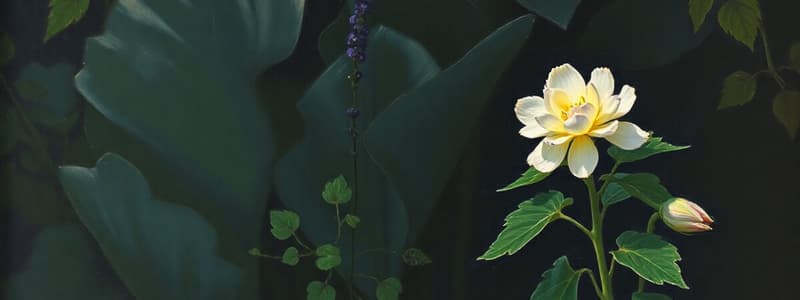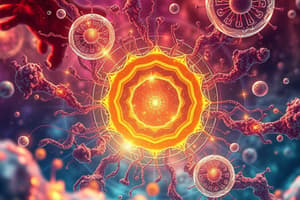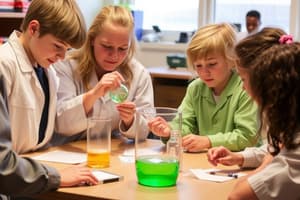Podcast
Questions and Answers
Which of the following is a benefit of using ladybugs for controlling aphid populations?
Which of the following is a benefit of using ladybugs for controlling aphid populations?
- They require chemical pesticides to thrive.
- They reproduce quickly. (correct)
- They can harm beneficial plants.
- They consume only a specific type of pest.
Mechanical pest control methods include the use of traps and barriers.
Mechanical pest control methods include the use of traps and barriers.
True (A)
What process is primarily responsible for the movement of water from the roots to the leaves of a plant?
What process is primarily responsible for the movement of water from the roots to the leaves of a plant?
- Cohesion
- Photosynthesis
- Transpiration (correct)
- Respiration
What is the primary pest control method used when ladybugs are introduced to a garden?
What is the primary pest control method used when ladybugs are introduced to a garden?
Adhesion helps in the movement of water in plants by allowing water molecules to stick to the walls of xylem vessels.
Adhesion helps in the movement of water in plants by allowing water molecules to stick to the walls of xylem vessels.
Sandy soils are known for their __________ water retention characteristics.
Sandy soils are known for their __________ water retention characteristics.
What is the main role of cohesion in water transport in plants?
What is the main role of cohesion in water transport in plants?
Match the flower part with its function:
Match the flower part with its function:
The process by which plants convert light energy into chemical energy is called ______.
The process by which plants convert light energy into chemical energy is called ______.
Which of the following best defines respiration in plants?
Which of the following best defines respiration in plants?
Which of the following is true about clay soil compared to sandy soil?
Which of the following is true about clay soil compared to sandy soil?
Give two examples of mechanical pest control methods.
Give two examples of mechanical pest control methods.
Both photosynthesis and respiration occur in the chloroplasts of plant cells.
Both photosynthesis and respiration occur in the chloroplasts of plant cells.
Match the process with its definition:
Match the process with its definition:
Clay soil retains __________ water compared to sandy soil.
Clay soil retains __________ water compared to sandy soil.
In biological pest control, natural enemies are used to manage ______ populations.
In biological pest control, natural enemies are used to manage ______ populations.
How do plants primarily move water from their roots to their leaves?
How do plants primarily move water from their roots to their leaves?
Xylem's role in plants is to absorb sunlight.
Xylem's role in plants is to absorb sunlight.
What is the process called when water evaporates from the leaves, creating a pull to move water upward?
What is the process called when water evaporates from the leaves, creating a pull to move water upward?
The function of stomata in plants is to control water _____.
The function of stomata in plants is to control water _____.
Which word equation correctly describes aerobic respiration?
Which word equation correctly describes aerobic respiration?
Which of the following is a byproduct of respiration?
Which of the following is a byproduct of respiration?
Match the following plant pests to their classifications:
Match the following plant pests to their classifications:
Which of the following can be an environmental effect of chemical plant control methods?
Which of the following can be an environmental effect of chemical plant control methods?
Flashcards
Ladybug Pest Control Benefits
Ladybug Pest Control Benefits
Using ladybugs to control aphids in gardens can reduce reliance on harmful chemicals, and promote natural pest control methods. Ladybugs are predators of aphids, efficiently reducing aphid numbers.
Ladybug Pest Control Risks
Ladybug Pest Control Risks
Ladybugs might not be effective if aphid populations are extremely high. They might not stay in the garden long enough to effectively control the aphid population; require additional steps to ensure the ladybugs stay and reproduce. You also need to ensure the ladybugs used are not contaminated with disease or other harmful substances.
Pest Control Method (Ladybug)
Pest Control Method (Ladybug)
Biological pest control using natural predators to control pests. In this case, ladybugs are used to control aphids.
Mechanical Pest Control
Mechanical Pest Control
Signup and view all the flashcards
Mechanical Pest Control Examples
Mechanical Pest Control Examples
Signup and view all the flashcards
Sandy Soil Characteristics
Sandy Soil Characteristics
Signup and view all the flashcards
Clay Soil vs. Water Retention
Clay Soil vs. Water Retention
Signup and view all the flashcards
Flower Filament Function
Flower Filament Function
Signup and view all the flashcards
Flower Petal Function
Flower Petal Function
Signup and view all the flashcards
Flower Stigma Function
Flower Stigma Function
Signup and view all the flashcards
Flower Pistil Function
Flower Pistil Function
Signup and view all the flashcards
Water movement in plants
Water movement in plants
Signup and view all the flashcards
Xylem's role
Xylem's role
Signup and view all the flashcards
Transpiration pull
Transpiration pull
Signup and view all the flashcards
Stomata function
Stomata function
Signup and view all the flashcards
Aerobic Respiration
Aerobic Respiration
Signup and view all the flashcards
Respiration byproduct
Respiration byproduct
Signup and view all the flashcards
Plant Pest Example
Plant Pest Example
Signup and view all the flashcards
Chemical control effects
Chemical control effects
Signup and view all the flashcards
Fungal Plant Pest Example
Fungal Plant Pest Example
Signup and view all the flashcards
Plant Water Transport
Plant Water Transport
Signup and view all the flashcards
Cohesion
Cohesion
Signup and view all the flashcards
Adhesion
Adhesion
Signup and view all the flashcards
Transpiration
Transpiration
Signup and view all the flashcards
Celery Experiment
Celery Experiment
Signup and view all the flashcards
Respiration
Respiration
Signup and view all the flashcards
Photosynthesis
Photosynthesis
Signup and view all the flashcards
Study Notes
End of Term Examination - Form Three Integrated Science
- Exam Duration: 1 hour and 30 minutes
- Exam Structure: Three sections
- Section One: 20 multiple choice questions (1 mark each)
- Section Two: 11 structured questions
- Section Three: Two options; answer all questions in this section
Section One - Multiple Choice
- Question 1: Which structure transports water and minerals in plants? (Xylem)
- Question 2: What is the main function of phloem? (Transport of sugars and nutrients)
- Question 3: Primary gas used by humans in cellular respiration? (Oxygen)
- Question 4: Part of the cell responsible for ATP production in aerobic respiration? (Mitochondria)
- Question 5: Byproduct of anaerobic respiration in yeast cells? (Ethanol and Carbon Dioxide)
- Question 6: Primary function of photosynthesis in plants? (Convert light energy into chemical energy stored in glucose)
- Question 7: Word equation for photosynthesis? (Carbon dioxide + Water + Light energy --> Glucose + Oxygen)
- Question 8: Pigment primarily responsible for absorbing light energy during photosynthesis? (Chlorophyll)
- Question 9: Why do we boil a leaf in water before testing for starch? (To remove chlorophyll and soften the leaf)
- Question 10: Reagent to test for starch in a leaf? (Iodine solution)
- Question 11: What color indicates the presence of starch when using iodine solution? (Blue-black)
- Question 12: How do plants mainly transport water from roots to leaves? (Transpiration pull)
- Question 13: What role does the xylem play in water movement? (Transports water from roots to leaves)
- Question 14: Process where water evaporates from leaves, creating the pull for water movement? (Transpiration)
- Question 15: Function of stomata in water movement? (Control water loss by regulating gaseous exchange)
- Question 16: Word equation for aerobic respiration? (Glucose + Oxygen → Carbon Dioxide + Water + Energy)
- Question 17: Byproduct of respiration? (Carbon Dioxide)
- Question 18: Example of an insect considered a plant pest? (Earthworm)
- Question 19: Example of an environmental effect of chemical plant control methods? (Water contamination)
- Question 20: Example of a fungal plant pest? (Rust)
Section Two - Structured Questions
- Question 1: Diagram analysis related to soil type determination
- Question 2: Chlorophyll location and importance
- Question 3: Water transport in plants (cohesion, adhesion, transpiration)
- Question 4: Effectiveness of using a celery stalk and food coloring experiment. Also, strengths and limitations
- Question 5: Define respiration
- Question 6: Define photosynthesis
- Question 7: Interdependence of respiration and photosynthesis
- Question 8: Benefits and risks of using ladybugs as pest control
- Question 9: Mechanical pest control methods and their strengths/weaknesses over chemical methods
- Question 10: Three characteristics of sandy soil
- Question 11: Two ways clay soil differs from sandy soil in water retention
Section Three - Choose One Question
- Question 1: Flower parts and their functions
- Question 2: Plant part that produces pollen grains OR What is the main function of chloroplast?
- Question 3: Soil types and characteristics
Studying That Suits You
Use AI to generate personalized quizzes and flashcards to suit your learning preferences.




